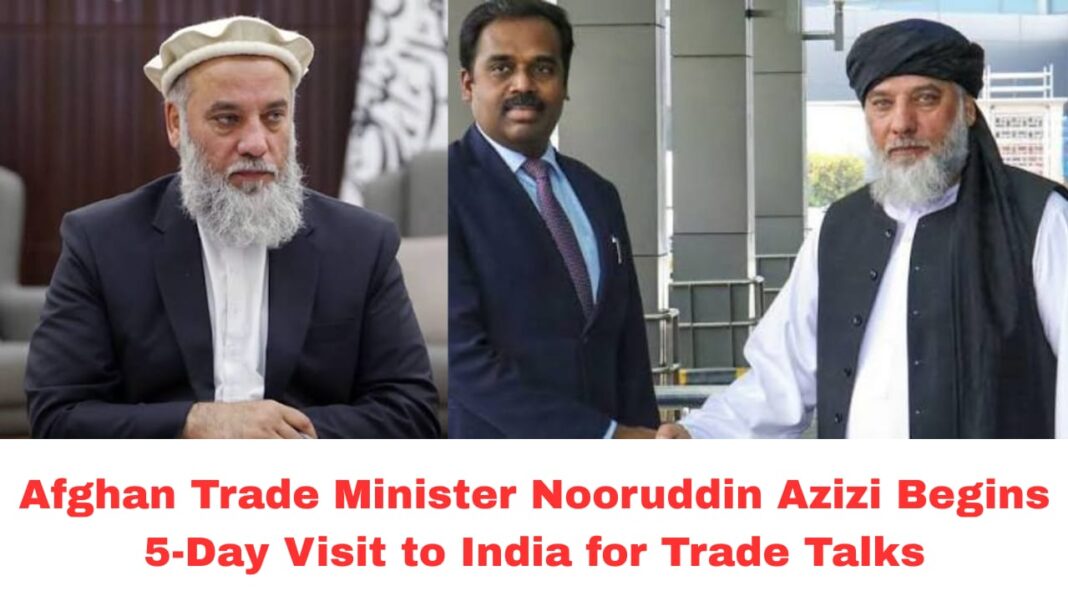Digital News Guru National Desk:
Taliban Commerce Minister Azizi Begins Strategic Five-Day Visit to India
Alhaj Nooruddin Azizi, Afghanistan’s acting Industry and Commerce Minister under the Taliban regime, landed in New Delhi on November 19, 2025, for a high-stakes, five-day official visit aimed at deepening trade and investment ties with India. The trip comes at a particularly sensitive moment: Pakistan has shut several key land border crossings with Afghanistan, putting severe strain on Afghan exports and pushing Kabul to look for alternative trade routes.
A Critical Visit in a Challenging Context
Azizi’s India mission follows closely on the heels of a recent trip by Afghan Foreign Minister Amir Khan Muttaqi, signaling a coordinated effort by the Taliban-led government to re-engage India economically even as diplomatic recognition remains fraught. According to India’s External Affairs Ministry, the Afghan delegation will meet senior ministers, business leaders and investors.

On the Afghan side, the Ministry of Industry and Commerce has stated that this visit is centered on four main objectives: expanding economic cooperation, facilitating trade, enabling joint investments, and solidifying Afghanistan’s role in regional transit networks. The Afghan team’s schedule includes a visit to the India International Trade Fair (IITF) 2025, where Azizi met with Indian and Afghan traders to explore market access and business opportunities.
Why the Chabahar Port Is Key
One of the most strategically significant elements of Azizi’s agenda is the use of Iran’s Chabahar Port, managed in part by India. Kabul sees Chabahar as a vital lifeline—a transit route that bypasses Pakistan’s territory and provides Afghanistan with access to the sea. This is especially important now, as Pakistan’s border closures have hit Afghan trade hard. Azizi has explicitly called for “effectively utilising” Chabahar’s capacity during his India visit.
From Afghanistan’s perspective, increased trade via Chabahar could help lower transport costs and diversify export destinations. For India, this is also a strategic opportunity: strengthening ties with Kabul helps India expand its economic influence in Afghanistan, while also securing a role in regional transit corridors that could counterbalance rival players.
Economic Stakes & Investment Prospects
Azizi’s delegation is not just aiming for trade deals — they also want investment, especially in key sectors such as mining and hydropower. Afghanistan has long been known to be rich in mineral resources, but decades of conflict and lack of infrastructure have kept much of this potential untapped. By courting Indian capital, Kabul hopes to accelerate the development of its energy and resource sectors.
On the Indian side, the trade can flow both ways: India already exports pharmaceuticals, textiles, machinery, and staple foods like sugar, tea, and rice to Afghanistan. Meanwhile, Afghanistan can offer agricultural products, minerals, and possibly processed goods for the Indian market.

The Pakistan Factor: Border Shutdown & Losses
A driving force behind this visit is the recent closure of several major Afghan-Pakistan crossings. These closures, stemming from border clashes and political tension, have dealt a heavy blow to Afghan exporters, particularly fruit traders. According to Azizi, Afghanistan is losing $200 million a month due to the disruption.
Frustrated by the repeated border restrictions, Kabul is pushing its business community to rethink trade flows and reduce dependence on Pakistan. With Indian engagement, Azizi hopes to offer Afghan merchants a more stable and reliable partner.
Diplomatic Nuance: Engagement Without Recognition
Azizi’s visit underscores a delicate diplomatic tightrope. While India has not formally recognized the Taliban government, it has been steadily expanding its engagement: India recently upgraded its mission in Kabul to a full embassy, reflecting a shift toward more meaningful economic and strategic ties.
This cautious but pragmatic approach lets India balance its geopolitical interests: engaging an important neighbour and potential transit partner, while not fully endorsing the Taliban regime.
Challenges Ahead: Risks & Realism
There are no guarantees that the visit will yield sweeping agreements. For one, Chabahar, though promising, requires sustained investment, efficient logistics, and good coordination—not just between India and Afghanistan, but also with Iran.
Security in Afghanistan remains a concern, and long-term projects like hydropower or mining will need guarantees and protection. The Taliban’s political structure and governance style can pose additional risks for Indian investors.
Moreover, despite India’s growing engagement, broader recognition of the Taliban remains limited globally, and this may constrain some investments or raise reputational risks.

Strategic Implications: A Regional Game-Changer
If successful, Azizi’s trip could be a turning point in India-Afghanistan relations. By anchoring trade through Chabahar and strengthening investment links, both countries can chart a more stable and interdependent economic future. For Afghanistan, it’s about finding escape routes from economic isolation and Pakistani over-dependence. For India, it’s an opportunity to deepen its footprint in a strategically important neighbour, while supporting connectivity and trade across South and Central Asia.
In a broader sense, this visit signals a recalibration in regional trade dynamics. With major cross-border tensions elsewhere, Afghanistan’s pivot to India (and via Chabahar) might reshape how landlocked and conflict-hit countries engage with global markets.
What’s Next
Over the coming days, watchers will closely monitor the outcomes of Azizi’s meetings: Will there be concrete MOUs on trade or infrastructure? Will India commit to major investments in Afghan mining or hydropower? And critically, how much traction will Chabahar gain as an operational transit hub?
Beyond this trip, the key question is whether this tentative engagement will mature into a long-term partnership—or remain a short-term fix in response to Pakistan’s economic pressure. Regardless, Azizi’s visit is a clear signal: Afghanistan is serious about diversifying its trade ties, and India is willing to play a central role.
You May Also Read: Delhi Schoolchildren File HC Petition to Ban Outdoor Sports During ‘Severe’ AQI Months








